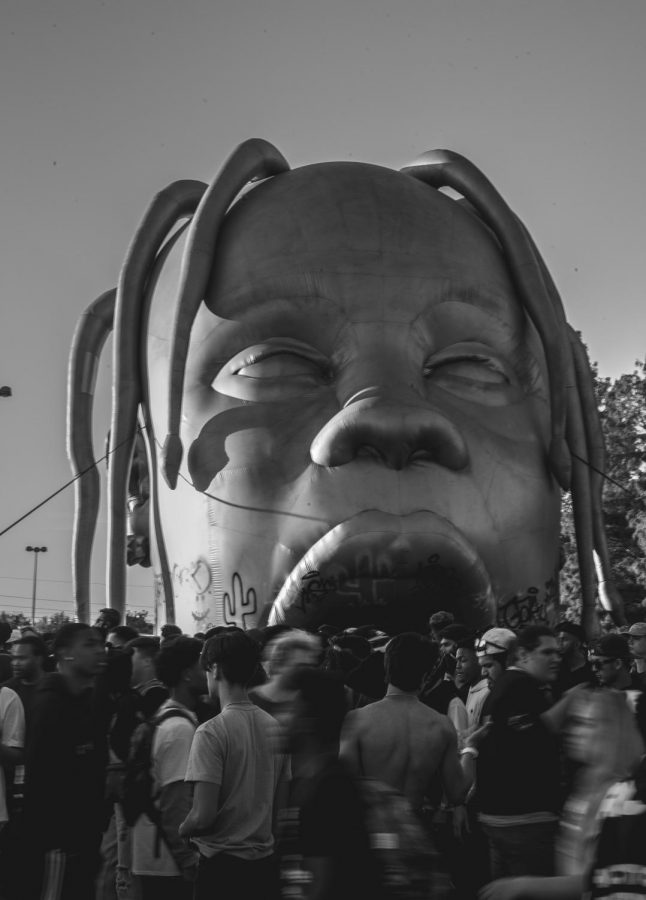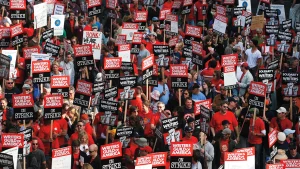Astroworld Festival Casualties Lead to Examination of “Mosh Pit” Culture
Used from Alexander Londono via Unsplash under Creative Commons.
Astroworld statue. The giant golden statue of Scott’s head is a staple of the entrance into the music festival. However, the densely packed corwds of the festival also became a staple, showcasing Scott’s interpretation of “mosh pit” culture.
November 10, 2021
Rapper Travis Scott’s Astroworld Festival on Nov. 5-6 became instantly notorious for its overwhelming crowds and a densely-packed mosh pit that eventually led to a dangerous crowd surge, the deaths of many fans, and severe backlash for the artist.
Astroworld was supposed to be a two-day event at Houston’s NRG Park with 50,000 tickets sold. Instead, as soon as Scott came onstage, the crowd started surging forward, crushing fans and resulting in the death of at least 8 attendees and hundreds of hospitalizations. The deaths ranged from ages 14-27; the youngest of the hospitalizations was a 9-year-old.
Survivors of the mosh pit shared their stories with various news outlets; some couldn’t get out of the pit, while others found themselves passing in and out of consciousness, and even more lost their friends in the chaos. The concert ended at 10:10 at night when emergency responders forced it to stop.
Many have taken to social media to share their stories and debate the culpability of both Scott and the management company involved with Astroworld. Several Travis Scott fans argued that the rapper wasn’t responsible for the tragedy, stating that the production company should have made sure there were enough exits and space for every attendee.
Ms. Allen, South’s AP Psychology teacher, spoke on the possible psychological phenomena that could have lead to the event.
“The events that occurred at the Astroworld Festival were tragic,” she said. “When you have a large crowd at a concert, sports game, or festival, emotions and excitement are heightened. People can experience a common phenomenon known as deindividuation, where people experience a loss of self-awareness and individual identity.”
Allen explained further, “People also tend to feel anonymous in a large group, which reduces their sense of accountability and responsibility. All of this combined with the post-Covid excitement of attending a music festival and the super-sized crowd all played a part in the tragic events that occurred that day.”
Kylie Jenner came to Scott’s defense on Instagram, adding, “And also for Travis who I know cares deeply for his fans and the Houston community, I want to make it clear we weren’t aware of any fatalities until the news came out.”
However, others see a different perspective – and hold Scott at fault. The first issue, they argue, lies in Scott’s continuation of the performance despite Houston police warning him prior to the event that there would be safety concerns. Eyewitness accounts state that Scott continued performing 30 minutes after the police declared the event a “mass casualty event.” This reflects a nexus in Scott’s pattern of behavior: the rapper has a history of encouraging his fans to breach security barricades and perform other types of reckless behavior at huge music festivals such as Lollapallooza, where officials arrested him for it.
The second argument for Scott’s culpability lies in what many concert-goers refer to as “mosh pit etiquette.” This is a set of unspoken rules that govern what is and isn’t acceptable in a mosh pit.
“Moshing isn’t about getting into a mess of people and punching everyone in the head,” writes Courtney Fry of Pedestrian.tv. “It’s about a release of energy, an interaction with the body, the music, and the emotion each holds.”
Mosh pit culture emerged from the American Hardcore music scene in the ‘80s, a genre that was a fusion of metal and punk. However, the etiquette describes it as more than just a way of being aggressive. ABC Radio laid out a few of the rules that govern the practice: if someone falls, pick them up. Form barriers around the edge and help those trying to get out. Don’t hurt people on purpose, and follow what security says. Therefore, the insanity of the mosh pit is actually a form of organized chaos that relies on the integrity of the moshers. The question remains as to whether or not these rules have translated across subcultures.
A huge part of mosh culture etiquette also lies on the performer themselves. Historically, artists have stopped performing as soon as they see anyone being hurt, and artists have even ended concerts early if the damage became too severe. After the Astroworld tragedy prompted criticism of mosh pits, punk fans quickly responded with a video of Chester Bennington from Linkin Park stopping his concert to help an injured fan, arguing that the tragedy wasn’t mosh culture’s fault, and the blame falls on its participants.
Several accounts provide contradicting viewpoints on Scott’s behavior concerning the mosh pit. While some argue that he was attentive and stopped his show multiple times, others say he ignored people directly in front of him and continued performing.
While the result of the lawsuits against Scott remain to be seen, the event has caused a serious reevaluation of music festivals in general as well as mosh pit etiquette across many musical subcultures.






